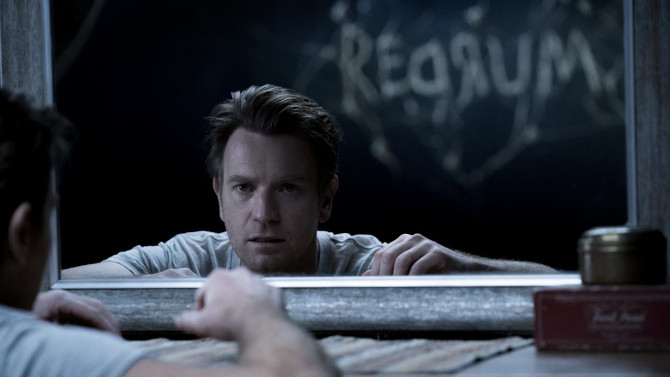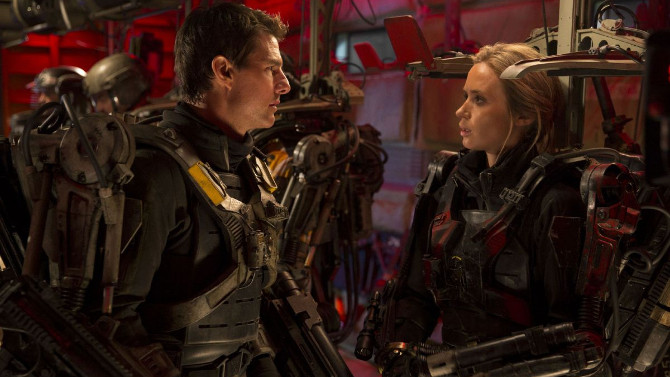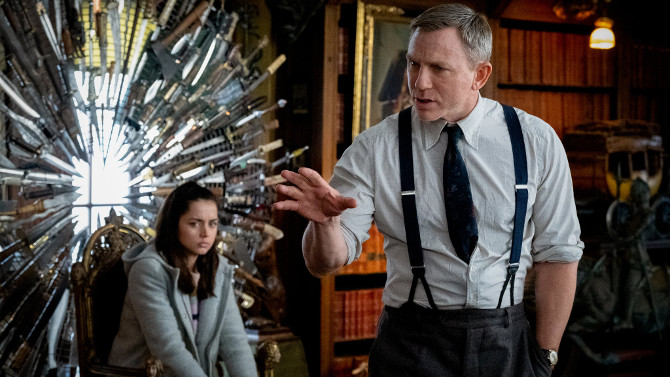
An Attaché Case
In 2025, dare I say that it’s nice to be highlighting a film made for mature audiences. Avoiding the pratfalls of sequels, remakes, comic book movies, and overly costly bombast, Black Bag, written by David Koepp (Mission: Impossible) and directed by Steven Soderbergh (Traffic), is most easily described as an old school spycraft feature. Opening with an extended tracking shot of spy George Woodhouse (Michael Fassbender) making his way through a happening nightclub in London, his contact soon informs him that there is a rat leaking some sort of tech software named Severus from within the agency. If there is one thing Woodhouse despises, it’s a liar, so he invites all of the suspects to a dinner party to try to get to the bottom of it.
-

Rarely Seen
The Invisible ManOctober 21, 2020A rare example of a remake done right, 2020's The Invisible Man, written and directed by Leigh Whannell, takes the general idea from the 1933 classic (as well as the 1897 novel by H.G. Wells) and updates it for the twenty-first century, never going too far, giving it a crisp, claustrophobic feeling. Stuck in a violent, psychologically draining relationship, we are dropped right into the troubled life of Cecilia Kass (Elisabeth Moss), a woman who is trapped under the all-controlling dome of tech wiz millionaire Adrian Griffin (Oliver Jackson-Cohen) – who has hit it big in the field of optics. Disturbingly controlling, his abode, like the overall story, has been updated for the twenty-first century – instead of a gothic castle full of secret passages and torches, it is a sleek, ultra modern, hyper reflective open floor-plan mansion teetering on the edge of the ocean. . . with all of the technology needed to keep the outside world at bay (and the inside guests trapped).
-

Midsommar Murders
MidsommarOctober 18, 2020If you were ever to create a list of unsafe places to travel, it is unlikely that Sweden would even make it anywhere near that piece of paper, or tech device – for those more modern individuals. Though after watching 2019's Midsommar, written and directed by Ari Aster (who exploded onto the scene with 2018's Hereditary), some people might be reconsidering the stunning Scandinavian country. A slow burner of a dark horror mystery fairytale in the vein of The Wicker Man (preferably the 1973 vehicle starring Christopher Lee rather than the 2006 remake with Nicholas Cage), this narrative starts off in a pretty dark and depressing way. Let’s just say that Dani (Florence Pugh – Little Women), who is in her early twenties, becomes orphaned in the blink of an eye.
-

Midnight, the Stars and You
Doctor SleepOctober 10, 2020Walking a tightrope between overt nostalgia picture and standalone film in its own right, 2019's Doctor Sleep comes to life thirty-nine years after Stanley Kubrick’s The Shining became an instant horror classic loved by almost everyone. . . except by its own author, Stephen King. This time, writer/director Mike Flanagan attempts to appease both sides, a gargantuan task that would could cause almost any talented film maker to crumble under the weighted pressure. . . yet somehow, he is able to stay on that extremely narrow tightrope, building an engaging narrative that should be fun for both hardcore fans and newbies to the so-called franchise. If The Shining was about addiction, Doctor Sleep looks at the long road back through rehabilitation to sobriety. Sometimes lost in all of the over-the-top craziness coming from Jack Nicholson’s fantastic portrayal of Jack Torrence, his poor son Danny must have had quite the life afterwards. Giving us a bird’s eye view into this character, he is now an alcoholic adult (played by Ewan McGregor), running from his past demons and any semblance of a normal life in the present.
-

Turning Back Time
TenetAugust 30, 2020A title with so many connotations – of course, it speaks to the fascinating time tinkering found in Christopher Nolan’s new film Tenet, but it also refers to a pre-Covid time. . . a place where people nonchalantly made the trek to movie theatres where packed crowds would communally enjoy the newest blockbusters. Whether Tenet will be able to turn back time and safely fill cinemas during this new normal is yet to be seen. A mesmeric and visually stunning spectacle that finds Nolan playing within his favourite themes, Tenet is clearly self-indulgent, yet not to its own detriment. Following up works like Memento, The Prestige, Inception, Interstellar, and, to a lesser degree, Dunkirk, Tenet, for lack of a better description, is a sort of password. . . an entry by fire into a small group of people who are attempting to prevent World War III. It is a CIA agent simply known as The Protagonist (John David Washington – BlacKkKlansman), who is introduced into this precarious, mind-bending new world.
-

Live on the Edge
Edge of TomorrowMay 3, 2020What was once 2014's Edge of Tomorrow has somehow become known as Live Die Repeat. I’m still not exactly sure how this has happened (my guess is that it would be partly due to the fact it didn’t do very well upon its U.S. release), as you would think a title is a title. . . yet, with a simple catchy tagline (that, in essence, is a definition of the film’s narrative), it has overshadowed the original title – meaning that, by the time posters, DVD and Blu-Rays were released, the slogan featured more predominantly than the original title. . . it is rare hearing anyone even refer to it by Edge of Tomorrow anymore. A clever alien reworking of D-Day fused with a Groundhog Day premise, it brings two of Tom Cruise’s favourite people together to craft a perfect vehicle for the action superstar. Chistopher McQuarrie (who has worked with the actor seven times. . . and has three more projects in the works with him), who co-writes along with brothers Jez and John-Henry Butterworth (adapting the piece from Hiroshi Sakurazaka’s manga “All You Need Is Kill”), and director Doug Liman (who has made two recent movies with Cruise. . . and has another in the works), bring this sci-fi world to vivid life.
-

Blanc Check
Knives OutApril 6, 2020An Americanized twist on the Agatha Christie murder mystery, Rian Johnson writes and directs Knives Out (2019), an entertaining crime-centric dramedy that earned him an Academy Award nomination for Best Original Screenplay. Centred on the suicide (or is it murder – cue the dramatic music) of famed crime writer and patriarch Harlan Thrombey (Christopher Plummer), he was the centre (and benefactor) of his entire family. Though this is the genesis event, the main player is actually his kind-hearted and thoughtful caretaker/nurse, Marta Cabrera (Ana de Armas) – someone who is constantly reminded by Harlan’s relatives that she is a part of the family (despite them claiming she is from Ecuador, Cuba, Uruguay, Paraguay and Brazil – definitely part of the family). With a really weird disorder, she vomits anytime she attempts to lie – not good in a murder mystery.
